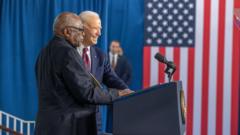With an aging guard leading the Democratic Party, the necessity for generational change is echoed in conversations from the party's base. The pivotal Wilmington fish fry, a gathering that has been a staple celebration in the party, now serves as a reflection point for members weighing the future of Democratic leadership. Congressman Jim Clyburn, at 84, remains a symbol of traditional party values, but recent developments in electoral losses challenge the status quo.
During the recent gathering, the somber news of Biden’s diagnosis of stage 4 prostate cancer looms large, accentuating the urgency for younger political representation. With many senior members of Congress seeking re-election, there is a palpable tension as calls for a youth movement grow stronger.
Ashley McIntyre Stewart aptly pointed out, "We have a geriatric problem," advocating for youth representation to prevent continued Republican dominance. The contrast between the seasoned experience of politicians like Clyburn and newfound energy from younger candidates underlines a major crossroads for the Democrats. While many voters prioritize the wisdom tied to age, the discontent with the current political landscape has created a ripe opportunity for fresh candidates seeking to bring new perspectives to the table.
The emerging narratives at the party fish fry reflect a recognition of young activists and their potential to foster energy and passion necessary for the Democratic Party's resurgence. Recent advances by young leaders like Saikat Chakrabarti and Jake Rakov demonstrate the shifting tides as they challenge older incumbents, pushing for diversity in representation.
The appeal for younger leadership culminates as political figures discuss the future of the Democratic Party in a post-Trump political environment. Governor Wes Moore, the third Black governor in U.S. history and just 46 years old, articulates a vision of empowerment for his generation during his address at the event, igniting enthusiasm among attendees.
However, Democratic leaders must navigate these discussions actively, focusing on how electoral strategies can adapt to unify both seasoned figures and energetic newcomers. With South Carolina poised to play a vital role in upcoming elections, how the party reconvenes its approach amidst age and experience versus youth and vitality remains crucial.
The path forward for the Democratic Party may lie in its ability to reconcile these intergenerational differences and adapt to the evolving demands of their constituents. As younger voices emerge within the party framework, the next critical steps seem clear: balancing the wisdom gained from years in office with the innovative, fresh ideas necessary to engage a new generation of voters.
As the 2024 elections approach, the fusion of experience and youth may ultimately define the Democratic Party's ability to reclaim its narrative against Republican rivals. Conversations like those at the fish fry will shape the trajectory of the party in the crucial battlegrounds to come.
During the recent gathering, the somber news of Biden’s diagnosis of stage 4 prostate cancer looms large, accentuating the urgency for younger political representation. With many senior members of Congress seeking re-election, there is a palpable tension as calls for a youth movement grow stronger.
Ashley McIntyre Stewart aptly pointed out, "We have a geriatric problem," advocating for youth representation to prevent continued Republican dominance. The contrast between the seasoned experience of politicians like Clyburn and newfound energy from younger candidates underlines a major crossroads for the Democrats. While many voters prioritize the wisdom tied to age, the discontent with the current political landscape has created a ripe opportunity for fresh candidates seeking to bring new perspectives to the table.
The emerging narratives at the party fish fry reflect a recognition of young activists and their potential to foster energy and passion necessary for the Democratic Party's resurgence. Recent advances by young leaders like Saikat Chakrabarti and Jake Rakov demonstrate the shifting tides as they challenge older incumbents, pushing for diversity in representation.
The appeal for younger leadership culminates as political figures discuss the future of the Democratic Party in a post-Trump political environment. Governor Wes Moore, the third Black governor in U.S. history and just 46 years old, articulates a vision of empowerment for his generation during his address at the event, igniting enthusiasm among attendees.
However, Democratic leaders must navigate these discussions actively, focusing on how electoral strategies can adapt to unify both seasoned figures and energetic newcomers. With South Carolina poised to play a vital role in upcoming elections, how the party reconvenes its approach amidst age and experience versus youth and vitality remains crucial.
The path forward for the Democratic Party may lie in its ability to reconcile these intergenerational differences and adapt to the evolving demands of their constituents. As younger voices emerge within the party framework, the next critical steps seem clear: balancing the wisdom gained from years in office with the innovative, fresh ideas necessary to engage a new generation of voters.
As the 2024 elections approach, the fusion of experience and youth may ultimately define the Democratic Party's ability to reclaim its narrative against Republican rivals. Conversations like those at the fish fry will shape the trajectory of the party in the crucial battlegrounds to come.






















